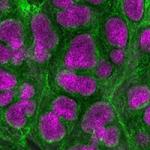
Heather Patisaul, Ph.D.
Senior Investigator
Division of Translational Toxicology / Mechanistic Toxicology Branch
NIEHS
Scientific Director
NIEHS/DTT
Research Topics
The Neurodevelopmental and Behavioral Toxicology Group seeks to understand how the environment may be contributing to rising rates of neurodevelopmental disorders (NDDs) by identifying the mechanisms by which endogenous hormones and other intrinsic signals influence NDD-related areas of brain development, sexual differentiation, and behavior. Using a variety of uniquely suitable animal models, including prairie voles because they spontaneously display prosocial traits including paternal care and monogamy, 2D and 3D brain imaging, behavioral testing, and a systems biology approach including a focus on the brain-placenta axis, the group aims to determine how neuroendocrine signaling fundamental to socioemotional behaviors may be vulnerable to endocrine disruption and developmental neurotoxicity. This research also aims to generate better tools and approaches for toxicologists to experimentally assess how environmental factors may sex-specifically contribute to NDDs; most of which lack defining pathology.
Major areas of research:
- Critical periods of sexual differentiation during development
- Role of the placenta on early brain development
- Environmental influence on socioemotional behaviors such as anxiety
Biography
Patisaul received her Ph.D. from Emory University where she completed seminal work on neuroendocrine disruption by soy isoflavones with Patricia Whitten and Larry Young. Following postdoctoral work at the Emory National Primate Research Center with Kim Wallen and Mark Wilson, she joined CIIT (which became the Hamner Institute) in 2004 and then NC State in 2006 where she ultimately served as the Associate Dean for Research in the College of Sciences for four years. Patisaul moved to NIEHS to head the Division of Translational Toxicology in 2024.
Related Scientific Focus Areas
This page was last updated on Monday, March 10, 2025


